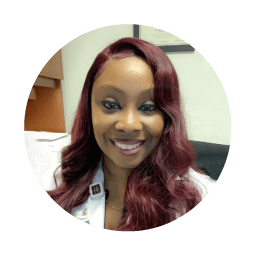Women in Executive Healthcare Leadership: Inroads Made Overall But Still Work in Progress
A 2019 McKinsey report, “Women in the Healthcare Industry,” shared encouraging insights about diversity gains. Healthcare outpaces corporate America regarding the representation of women at all job levels. When it comes to promotions and the initial advancement to manager, the gap between men and women is small. Women in healthcare also report higher career satisfaction (75% vs. 71% compared to men).
Great stats when you look at the forest. But what about the trees?
As you move closer to executive leadership positions, the number of women still shrinks. For white women, 41 percent are in entry-level positions, vs. 26 percent at the C-suite level. For Black women, 26 percent hold entry-level jobs, and just a paltry 4 percent are at the C-suite level.
In celebration of Women’s History Month, we spoke with some of the women in our Perioperative Power List Class of 2023 about their career paths toward executive leadership. One theme was mentorship, a process that most nurses must curate independently or be lucky enough to have a supervisor notice their potential. We also learned that while higher positions lean heavily male, some organizations, such as CHRISTUS Health, have successfully created more diverse executive teams.
Is there an experience that has significantly influenced your career trajectory?

Dr. Edna Gilliam, DNP, MBA, EN, CNOR, Assistant VP of Perioperative Services/SPD, Nemours Children’s Health
“In high school, I always wanted to be a nurse. I was in the Future Nurses of America Program. I was a candy striper every summer. But after I graduated high school, I was really intimidated by the nursing program. So I went into finance and was in banking for 13 years. Then one day, my bank got robbed, and I thought, ‘I don’t like this job that much.’ So applied to nursing school and got in. I was a bank manager by day and a nursing student by night.
While in nursing school, I had the opportunity to go into the OR, and the surgeon took the time to show me what he was doing, and I got to see everything that was going on. After that, I was sold. [Being in the OR] was what I wanted to do, and I have never looked back.”

April Kranz, MSN, RN, CNOR, CENP, VP of Patient Care Services/CNO, Conway Regional Health
“I never intended to be a leader. When I was a staff nurse in the OR, a CNO said, ‘Hey, I think you’re great at processes, and you seem to be able to put the pieces together. I want you to be a clinical ambassador.’ It changed my career trajectory because it made me look at myself as a leader. I had someone who I thought was amazing in her leadership role that believed in me. Her belief in me was stronger than my belief in myself. That stuck with me and changed my entire career path.

Lynn Wyllie, MSN, BSN, RN, CNOR, VP of Perioperative Services, CHRISTUS Trinity Mother Frances Health System
“Coming here greatly impacted my career trajectory. Whitman Partners recruited me in 2016 to come to Texas. I lived in Wyoming and had never even been to Texas, and you convinced me to come here. I had a strong history with OR expansions, including designing an OR. At the time, CHRISTUS was building a micro-hospital that would have five operating rooms, so they were trying to find a director with that type of experience, which is a unique niche. So I was recruited to come here, and I love it. Since then, I have continued to grow within the organization and was promoted to the main campus, associate vice president, and more recently, vice president.”
As a female leader, have you had to amend your leadership or management style to gain staff trust?
Gilliam – “This is an interesting question but very relevant, especially being a woman of color. I am very intentional about my body language and how much I show passion. You can be very quickly labeled as difficult, confrontational, or angry. When men do it, they’re considered assertive, you know? But sometimes, women can be perceived as challenging or difficult so.”
Kranz – “My personality style is naturally very dominant. But that doesn’t work in a world where you have a lot of dominant people, like in the world of surgeons. Someone has to play a different role. I also understood that the majority of my staff needed to feel psychologically safe to promote conversations about safety, best practices, culture, etc. So I started talking to physicians and trying to be a partner. Instead of saying, ‘These are the guidelines that say it’s the right way, and I need you to do this,’ I say, ‘What if we tried this? And if it doesn’t work, we can go back to what it was before.’ It’s more influential to be partners and meet in the middle. You can’t meet dominance with dominance.”
Wyllie – “Things are a little different in my organization. Our president is male, but a lot of executives within our hospital, including our CEO, are female. I never felt like I had to do anything extraordinary to differentiate myself as a leader because I was a woman. Nursing is still a female-dominated profession, and our healthcare leadership team is comprised of a lot of nurses that have furthered their education with master’s degrees, MBAs, and things like that. So we’ve just rolled into these healthcare executive positions [at CHRISTUS].”
Do you have any female role models?
Gilliam – “Oh, so many. When I first became a nurse, there was an assistant nurse manager, Lorraine Bailey. I thought she was so mean. When I was on orientation, I thought, ‘Why do they keep putting me with her?’ But you know what? She taught me everything she knew and took me under her wing. I’m really grateful to her.
I had a CNO named Joanna Hurst, who was instrumental in my becoming a director of perioperative services. She recognized my talent, supported me through my DNP program, and encouraged me. Stepping into that role was difficult because it’s definitely lonely at the top sometimes. And lately, Dr. Katie Boston-Leary. I mean, she is awesome. She’s a beast and a VIP in everything she does. I’ve truly appreciated her mentorship.
Jane Mericle, my previous CNO and who got promoted to system CNE, was also instrumental in developing me as a senior director and now an Assistant VP. I was very nervous in this role, and she said, ‘I’m not going to let you fail. We’re in this together.’ We had some very transparent conversations, and she has always been supportive and empowering of me in going outside my comfort zone.
And then, my mother. She has helped and encouraged me through so much while I was in college (she didn’t go to college, but made sure I did) and later watching the kids.
Kranz – “There are two that stand out for me. The first was a director of a critical care unit. Her personality was similar to mine, and it really worked because I’d always felt I was different. As a leader, I focus on people and do the right thing. I don’t necessarily navigate the political minefield the same way that other people will. And so this person said, ‘I see you. I know you’re different.’ She’s now a senior vice president and is still my mentor. She made a huge difference in my career by telling me it’s okay to be yourself and authentic. If you’re not, you will come to work every day and hate who you are because you are not the person you are outside of here.
The second person was an executive director I reported to. She showed me that the sky is the limit. Anything that I ever thought that I could do, she said, ‘Okay, you can do it.’ And she gave me any resource. Even if she thought it was the wrong path I would take, she let me learn on my own and then supported me. If I came back and said that I may have messed this up, there was never a conversation about what she thought I should have done. She would always say, ‘How do we correct course?’
Wyllie – “Her name was Suzanne Johnsrud, and she saw potential in me. She encouraged me to continue my growth. I was working in the OR as a circulating nurse, and she approached me to become a charge nurse. From there, I then I moved up that chain. She’s fine now, but when she became ill with cancer, there were times she couldn’t go to meetings, and she’d asked me to go for her. It gave me a taste of leadership and empowered me. She has always been there for me throughout my entire career.”
How can perioperative leaders help nurture the next generation more systemically?
Gilliam – “I think we have to be intentional about that as leaders and tap talent on the shoulders. We should have shadow experiences and bring people in to show them what we do. I was one of those people for whom nursing was a second career. I needed people to make me aware of my talent and leadership skills. We always make mistakes as leaders, but we need to be able to say it’s okay. This is what we shouldn’t do next time.”
Kranz – “I think what Whitman Partners is doing, highlighting female and BIPOC leaders is something different that I have not seen other companies do. I think it’s amazing. We need to encourage female leaders to share their insights and have real conversations about the professional challenges they have faced. As the CNO, I am the only female on the executive team. I have the backing of the directors under me asking me to promote nursing and please be a voice for them. It can be intimidating because you’re coming into a world where you have to figure out where you fit in. I mentioned the political minefield earlier, and that’s when you have to decide when to have a conversation about something. Do I need to hold it for a different day? Doesn’t mean I will never have it, but it may not be the right time. I have to make those judgments so I can advance the things that are important.”
Wyllie – “If you Google CHRISTUS, you would find that we are in the top 10 for promoting diversity. We get diversity training and education, which is one of our core values. I think it’s important to let everyone know it’s one of your institution’s core values because it will help bring in people who share the same values. They’ll know this is a great place for them to work.”












